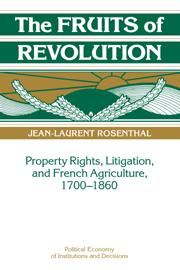Book contents
- Frontmatter
- Contents
- List of tables, figures, and maps
- Series editors' preface
- Preface
- 1 Introduction
- PART I HISTORY AND ECONOMICS
- PART II DRAINAGE AND IRRIGATION
- PART III PROPERTY RIGHTS AND LITIGATION UNDER ABSOLUTISM
- 8 The weaknesses of monopoly power
- 9 Settlement, litigation, and the drainage of marshes in England and France, 1600–1840
- 10 Conclusion
- Appendix 1 Wages, land prices, and interest rates
- Appendix 2 Estimating rates of return
- Appendix 3 Theoretical proofs
- Bibliography
- Index
8 - The weaknesses of monopoly power
Published online by Cambridge University Press: 27 March 2010
- Frontmatter
- Contents
- List of tables, figures, and maps
- Series editors' preface
- Preface
- 1 Introduction
- PART I HISTORY AND ECONOMICS
- PART II DRAINAGE AND IRRIGATION
- PART III PROPERTY RIGHTS AND LITIGATION UNDER ABSOLUTISM
- 8 The weaknesses of monopoly power
- 9 Settlement, litigation, and the drainage of marshes in England and France, 1600–1840
- 10 Conclusion
- Appendix 1 Wages, land prices, and interest rates
- Appendix 2 Estimating rates of return
- Appendix 3 Theoretical proofs
- Bibliography
- Index
Summary
Under the Old Regime, drainage and irrigation were stymied by litigation over property rights that dragged on for decades. Most of the courts, like the parlements or the conseil in which suits over water control were argued, were supposed to be final courts of appeal. Despite repeated claims of final and expeditive justice, however, the courts continued to hear appeals; hence, it is clear that they reneged on their promises of speedy trials. The courts did not keep their promises because they were not bound to honor their announcements.
As we shall see, kings, courts, and private individuals frequently announced future plans of action and later chose not to follow those plans. The inability of many actors in pre-Revolutionary France to commit to future plans dramatically increased transaction costs in some sectors of the economy. Solutions to problems of inconsistent announcements, although well known before 1789, were never effectively implemented under the Old Regime. In contrast, the governments that followed the Revolution steadfastly abided by contracts. More important, after 1800 the state forced other organizations to keep their promises as well. This chapter presents an investigation of the problems of commitment under the Old Regime in three areas that proved crucial to the development of water control: litigation, royal granting policies, and water rights.
To uncover the logic behind the actions of Old Regime organizations, let us examine the case of judicial officers in greater detail. Since civil litigation was quite costly in monetary terms, justice should have been prompt and appeals should have been discouraged unless they had good cause.
- Type
- Chapter
- Information
- The Fruits of RevolutionProperty Rights, Litigation and French Agriculture, 1700–1860, pp. 125 - 148Publisher: Cambridge University PressPrint publication year: 1992

